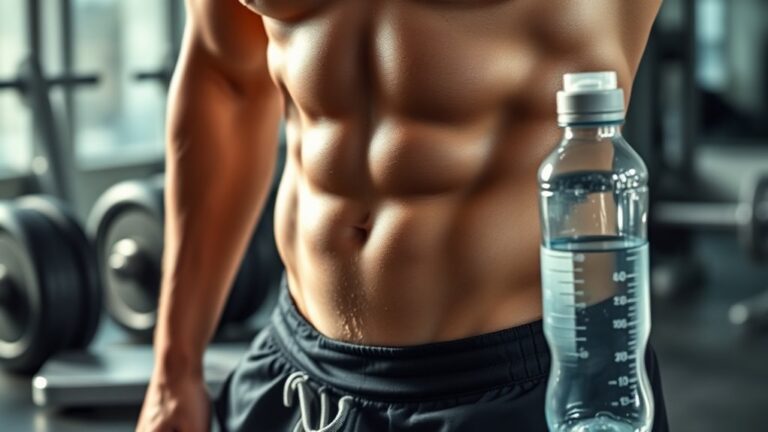Debunking the Biggest Gym Myths About Fat Loss

When it comes to fat loss, there are several myths you need to debunk. You don’t have to spend hours on cardio; short bursts of intense workouts can be more effective. Lifting weights won’t make you bulky, especially for women. Spot reduction is a myth—fat loss happens uniformly. You can’t outrun a bad diet; nutrition matters. And forget about relying solely on supplements for weight loss. Curious to find out more about these myths and the truths behind them?
Myth 1: You Need to Spend Hours Cardio to Lose Fat

While it’s a common belief that you need to spend hours on cardio to shed fat, the truth is much simpler. High-intensity intervals can be a game-changer for efficient fat burning. Research shows that short bursts of intense activity followed by rest periods can boost your metabolism and enhance fat loss more effectively than steady-state cardio. Just 20-30 minutes of high-intensity interval training (HIIT) can yield results similar to an hour of traditional cardio. Additionally, incorporating exercises like jumping rope can provide a more efficient calorie burn than running, making your workouts even more effective.
Myth 2: Lifting Weights Will Make You Bulky
Many people fear that lifting weights will lead to a bulky physique, but this misconception overlooks the complexities of how our bodies respond to strength training. In reality, weight training is essential for developing muscle definition and increasing your metabolism. Women, in particular, have lower testosterone levels, making it challenging to gain large muscle mass like men.
Instead, weight training helps you tone your body, increase strength, and enhance overall fitness. When combined with a balanced diet, it can lead to fat loss while sculpting a leaner appearance.
Moreover, lifting weights promotes a healthier body composition by replacing fat with muscle, which is denser and takes up less space. This change can give you that desired toned look without the bulk. So, don’t shy away from weights; embrace them to achieve your fitness goals and enhance your overall health! Additionally, visible improvements in body composition can be a motivating factor in your fitness journey.
Myth 3: Spot Reduction Is Possible

If you’ve ever wished to target fat loss in specific areas like your belly or thighs, you’re not alone. Many people fall victim to fat loss misconceptions, believing that targeted exercises can melt away fat from specific spots. Unfortunately, science doesn’t support this idea. When you lose fat, your body decides where it comes from, and that’s often a mix of various areas.
While exercises like crunches or leg lifts can strengthen muscles in those regions, they won’t necessarily lead to fat loss specifically in your abdomen or thighs. Instead, focusing on overall fat loss through a balanced diet and full-body workouts is more effective. Incorporating cardio exercises and strength training can help you shed fat more uniformly across your body. So, rather than chasing spot reduction, aim for a holistic fitness approach that promotes overall health and well-being.
Myth 4: You Can Outrun a Bad Diet
Although it might be tempting to think that intense workouts can compensate for poor eating habits, the reality is that exercise alone won’t negate the effects of a bad diet. In fact, diet quality plays an essential role in your overall fat loss journey. You can’t outrun a bad diet; no amount of cardio can erase the impact of excessive calories from processed foods.
To achieve and maintain fat loss, you need to find a balance between exercise and nutrition. Prioritizing whole foods, lean proteins, and healthy fats will enhance your efforts in the gym. Remember, it’s not just about burning calories but also about providing your body with the nutrients it needs to recover and thrive. Incorporating activities like jump rope can help engage core muscles and contribute to overall fat loss. So, instead of relying solely on workouts to offset poor eating, focus on a holistic approach that combines both exercise and a healthy diet for sustainable results.
Myth 5: Supplements Are Essential for Fat Loss

While focusing on your diet and exercise is essential, some people believe that taking supplements is the key to releasing fat loss. The truth is, supplement effectiveness can be overstated. Many weight loss pills or powders promise quick results, but they can’t replace the foundation of a solid diet and regular physical activity.
Research shows that diet quality plays a vital role in fat loss. Whole foods like fruits, vegetables, lean proteins, and whole grains provide nutrients that supplements often lack. Relying solely on supplements can lead to imbalances and missed opportunities for health improvement.
In fact, studies indicate that individuals who prioritize a balanced diet experience better long-term success in fat loss than those who lean heavily on pills. Additionally, incorporating an effective cardio workout like skipping rope into your routine can significantly enhance weight loss efforts. So, instead of chasing the latest supplement trend, focus on improving your diet quality and maintaining a consistent exercise routine for sustainable fat loss results.
Frequently Asked Questions
How Do I Determine My Ideal Daily Calorie Intake for Fat Loss?
Calculate your caloric deficit by considering your activity level and daily energy needs. Start with your maintenance calories, then subtract 500-1000 for a healthy fat loss. Consistency and monitoring are key to achieving your goals!
What Role Do Genetics Play in Fat Loss and Body Composition?
Genetic predisposition greatly influences your body composition and fat loss potential. While you can’t change your genetics, understanding them can help tailor your approach, maximizing your results through personalized nutrition and exercise strategies.
How Important Is Sleep for Effective Fat Loss?
You might think skipping sleep helps you lose weight faster, but good sleep quality actually boosts hormone regulation, supporting fat loss. Prioritize rest if you want to see real results in your fitness journey.
Can Stress Impact My Ability to Lose Fat?
Yes, stress can greatly impact your ability to lose fat. Elevated stress hormones like cortisol can lead to emotional eating, increasing cravings and promoting fat storage. Managing stress through relaxation techniques can enhance your fat loss efforts.
What Are the Best Ways to Maintain Fat Loss Long-Term?
To maintain fat loss long-term, focus on sustainable habits like regular exercise and mindful eating. These approaches help you stay in tune with your body, making it easier to manage weight and enjoy healthier choices consistently.





